Teaching Excellence Framework “Should Measure Erotic Capital” of Academics
April 1, 2017
A new study released today suggests that the government’s new Teaching Excellence Framework, which aims to assess the quality of teaching in universities, should also assess the “erotic capital” of academics. Dr Avril Sottise of the educational think tank the Institute for Studies (see link) argues in a new piece that the personalities of academics …
Visions of Sodom: Religion and Sexuality since the Reformation
March 14, 2017
In September 1850, the French savant Louis-Felicien de Saulcy, charged with a Mission Scientifique from the French government, and in the company of a Catholic priest and four young men on a tour of the East, set out to circumnavigate and map the Dead Sea. Four months later, on his way round the shores of …
The Botanical History of Genoa through the eyes of John Ray and Francis Willughby, 1664 to the Present
March 10, 2017
What can the botanical history of a place give to contemporary urban planning and cultural heritage? This is a question addressed in a new paper in Landscape History (see link) by Ross Balzaretti (Nottingham History), Charles Watkins (Nottingham Geography), Raffaella Bruzzone (Marie Curie fellow, Nottingham), and Carlo Montanari (University of Genoa). The authors have used …
Lincoln in the age of the Black Death
February 13, 2017
Did the Black Death, civic corruption, political decay and economic crisis lead to Lincoln’s precipitate economic decline in the fourteenth century? Nottingham Ph.D Alan Kissane’s new book Civic Community in Late Medieval Lincoln: Economy and Society in the Age of the Black Death, 1289-1409 challenges that view. Medievalists have usually seen Lincoln as declining from its …
How America got Fed Up with Experts
January 22, 2017
During last summer’s EU referendum campaign, far-right fellow traveller and failed politician Michael Gove famously said the British public had “had enough of experts.” Although Gove meant to discredit only those “experts” who disagreed with him, the expression of similar sentiments, especially on the right of the political spectrum, is not a recent phenomenon, but, …
How Nottingham Celebrated the Battle of Waterloo, or Didn’t, 1815
January 11, 2017
On hearing news of Napoleon’s defeat at Waterloo on 18th June 1815 (commemorated in Wilkie’s famous picture of the Chelsea Pensioners reading the Waterloo dispatch, right) locals in the Lake District lit a bonfire on top of Skiddaw and gathered there to celebrate, feasting on patriotic fare such as roast beef and plum pudding. The …
Siberian Exile: A Prison Without Walls
October 25, 2016
A Prison Without Walls? presents a snapshot of daily life for exiles and their dependents in eastern Siberia during the very last years of the Tsarist regime, from the 1905 revolution to the collapse of the Tsarist regime in 1917, writes Sarah Badcock. This was an extraordinary period in Siberia’s history as a place of punishment. …
The Medieval Credit Crunch
September 21, 2016
In medieval England, credit and debt united all classes, from husbandman John Bygge of Stortford, Hertfordshire, who had bought £6 of goods from London haberdashers and fishmongers, to the greatest magnates in England such as the Earl of Shrewsbury, who owed money to a London mercer. Even peasants like the shepherd John Rede of Soham, …
Livery and Loyalty in Medieval England
July 13, 2016
The livery collar had a pervasive presence in late-medieval England and Wales. Worn about the neck to denote service to a lord, references to the collar abound in government records, contemporary chronicles and correspondence, writes Matt Ward, now a postdoctoral fellow at the University of Nottingham. Many depictions of the collar can be found in …
King Hugh of Italy (c.885-948): Success and Failure
June 17, 2016
In his Antapodosis (‘Book of Revenge’, c. 960) the Italian bishop Liutprand of Cremona (d. c. 972) discussed the career of Hugh of Arles who had been the king of Italy between c.885 and 948 (pictured, left, in the twelfth-century chronicle of Johannes Berardi). It was his particular concern to cast a negative light on …

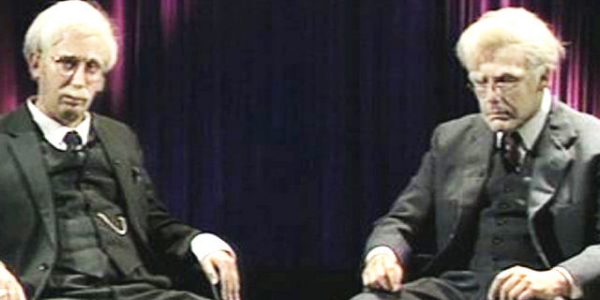
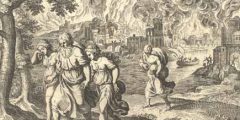
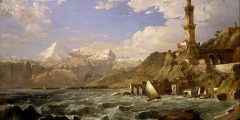


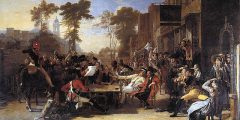

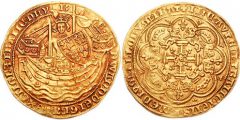
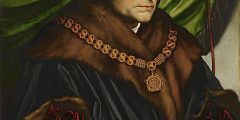
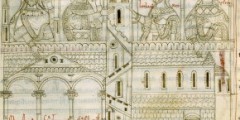
Recent Comments